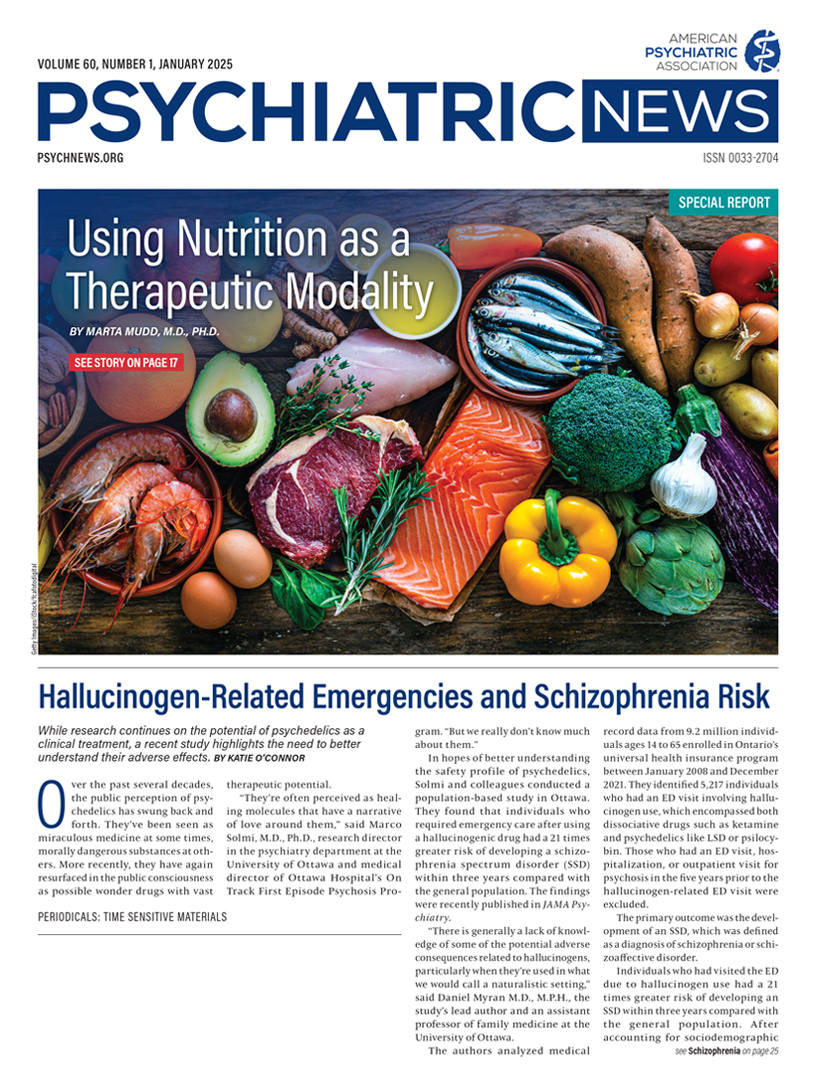As part of the “Lifestyle Psychiatry” theme introduced by APA President Ramaswamy Viswanathan, M.D., Dr.Med.Sc., the APA Board of Trustees approved the creation of a Presidential Workgroup on Lifestyle Psychiatry. This workgroup has been charged with developing educational materials and engaging members with this burgeoning psychiatry subspeciality.
The workgroup has made steady progress through the first half of its term, and APA membership will soon be able to view the fruits of its efforts, according to workgroup chair Gia Merlo, M.D., M.B.A., M.Ed., a clinical professor of psychiatry at NYU Grossman School of Medicine.
The centerpiece product of the workgroup will be a seven-hour “Introduction to Lifestyle Psychiatry” curriculum available to members on the APA website. The curriculum will feature seven hour-long courses—one each for the six pillars of lifestyle medicine (nutrition, physical activity, restorative sleep, avoidance of toxic substances, stress management, and connectedness) along with a course on the intersection of DEI and lifestyle.
“The scope of practice for lifestyle psychiatry goes beyond that of general lifestyle medicine,” Merlo said. “We need to do more than talk about preventing diabetes and heart disease. Fortunately, psychiatrists can adapt some of their practical knowledge, such as their understanding of stress management and focusing on a person’s overall well-being.”
To that end, the presidential workgroup created a series of study groups—one for each lifestyle pillar—to collaborate and build psychiatry-focused, evidence-based educational content for their topic. Drawing from the recent textbook “Lifestyle Psychiatry: Through the Lens of Behavioral Medicine” (which Merlo co-edited), each study group explored lifestyle treatments for multiple disorders, keeping in mind considerations for historically marginalized populations as well as differences based on patient age, sex, and gender.
Each study group was led by one of the six presidential workgroup members (see box) and met every two weeks from July to October 2024. “We had 130 members of APA’s Lifestyle Psychiatry Caucus sign up to join these workgroups, which gave us a diverse pool of knowledge to build our curriculum,” Merlo said.
The presidential workgroup is currently synthesizing the combined information and creating its proposed curriculum. In addition, the group is composing an article for the American Journal of Psychiatry highlighting practical tips about lifestyle psychiatry. “We will outline simple ideas like what psychiatrists can do in their office to reduce patient stress or what apps they can use to help patients improve their lifestyle,” Merlo said. She added that the presidential workgroup will present these deliverables to the Board of Trustees by May 2025.
May will also be the month of APA’s next annual meeting, which will have the theme of “Lifestyle for Positive Mental and Physical Health.” Merlo is chair of the meeting’s scientific program subcommittee on lifestyle and told Psychiatric News that she has reviewed dozens of interesting abstracts, so attendees can expect a lot of informative lifestyle-related sessions at the event.
The longer-term goal is to use all the materials collected during the study sessions as the foundation for a practice guideline on lifestyle psychiatry. “We have been a bit behind the eight-ball on this,” Merlo said. “Australasia has been developing
guidelines for lifestyle interventions for depression for years.”
While guidelines in other global regions can be useful, Merlo said it’s important to develop U.S.-based recommendations given the differences in health insurance structure and the need to consider racial/ethnic and community differences.
“Such a guideline is worth having since we can absolutely treat mild-to-moderate depression with lifestyle interventions alone,” she said. “And for more serious disorders like psychotic illness, lifestyle changes can decrease the dose of medication needed.” ■
